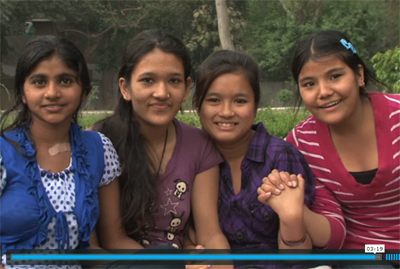Apna Haq

"Apna Haq" means "Our Right". For a long time now, many of our tech center students have been contemplating.. about what they can do to get their right... to pee when they need to pee. When I heard the their narrations of how they have to plan their visit to the toilet, which is a community toilet that about 100 or more families share, I went silent for a moment. I had only heard of this reality of many urban slums from others. This was the first time a group of young girls, who suffer the most due to lack of proper sanitation, shared their daily routine with me.
Jina (name changed) wakes up at 2am to queue up to collect water for her family. Though water supply actually starts at 5 am, she has to queue up atleast 3 hrs early so that she can get water early enough to be able to go to school. After placing her buckets in the queue, the next task is using the toilet and taking a bath. The toilets are dirty, hardly ever cleaned, do not have proper lighting, never have running water. But none of this is the main problem. The bigger problem is that the doors and windows are broken. So if she has to use the toilet, the best time is before the men in the colony wake up, unless she doesn't mind teenage and adult men alike peeping in to get a glance of her or even worse, click a photo of her in the toilet/bath. Once this early morning routine is done, the next time she would use the toilet would be only after dark. In between, the toilets in school would give some respite. To avoid visiting the toilet during the day, she would avoid drinking any water or eating enough food.
Over the last 3 years of our engagement with the girls, the issue of lack of proper toilets has been a constant topic of discussion. We have wanted to do something about it, but our own shortcomings in terms of resources, both human and monetary, has held us back. We know that if this issue is to be raised, we will have to engage with multiple stakeholders, including the municipal authories responsible for maintaining these toilets, community members, most importantly the boys and men in the community! This means the discourse will be intense and has to be consistent, which our small team may not be able to handle.
However, after 3 years of working with young women of the community, we can boast that one thing that we have been able to do is create a cadre of courageous girls ready to drive a campaign such as this. So when recently VOW Media of Amsterdam approached for partnership to work with the girls on a media project, we shared the opportunity with the girls. What if we use media to document the scenario, then use the tools to question the municipal authorities and community people alike? A big YES was the response that came in. With the help of our board member Kavita Dasgupta, long time volunteer Shilpi Sharma and VOW media co-founder Pooja Pant, we quickly made a short video to present the problem, which you can view by clicking here. And now the 6 month long project is planned to start from 15th of September 2013.
Apna Haq Project aims to train 20-30 young women over a period of 3 months in using photography, radio and video to create their own body of work tackling the issue of the lack of toilets in their homes. This body of work will then be shared through various organized screenings within their community and outside to raise awareness on the issue of health, hygiene and safety of young girls in urban slums of India and how this affects women’s rights worldwide. Further, the participants would gather community support to put pressure on local government authorities to improve the condition of public toilets. They would also facilitate awareness on women's safety within their community.
We are all very excited about the start of this project. If you want to get regular updates from us regarding the progress of the project, subscribe to our newsletter! We will surely keep you updated!
- Log in to post comments


